We read in Genesis 6 that when the sons of God saw how beautiful the daughters of man were, they took (for sexual union) whichever ones they decided. This happened in the days before the Flood of Noah, when wickedness increased on the earth. In those days also, the Nephilim were on the earth, an obscure term that some versions translate as “giants” (KJV, NKJV, GNB, AMP, LXX, etc.). The text may suggest that these “giants” were the offspring of the sexual union between the “sons of God” and “daughters of man” (ha-adam) (Genesis 6:1–4).
Who are the “sons of God” in Genesis 6? And who are the “daughters of man” and the “giants”? Bible readers often pose these questions. In this post we will cover the first two questions; we will reserve the third question about giants for a follow-up post (though if you want a sneak preview of that one, see my earlier interpretation in 99 Answers, pp. 65–68).
Essentially, there are three different interpretations of the sons of God—they are either from the genealogy of Seth, or royal rulers, or fallen angels. We will explore each of these claims.

View 1: The “Sons of God” refers to the Godly Line of Seth
This view claims that the “sons of God” in Genesis 6 were the sons of Seth, the third son of Adam (Gen 5:3–4). The “daughters of man” refers to the line of Cain, the son of Adam who slew his brother Abel (Gen 4). In other words, the passage relates the mixing of the godly line of Seth with the wicked lineage of Cain. These marital relationships produced exceedingly wicked persons; therefore, God sent the flood to wipe out everyone except Noah and his family (Gen 6:5–22).
Genesis 4:26b is sometimes used to support this viewpoint. In this verse, Seth begets a son named Enosh. If the verb “to call” is translated in the passive voice, the text reads that people or Enosh began to be called by the name of the LORD (see John Currid, A Study Commentary on Genesis, 1:158,174, translating the infinitive construct לקרא as a passive pual).
However, it seems to me that the more intuitive way of translating Genesis 4:26 is with “call” in the active voice—people began to call on the name of the LORD, as modern translations render it, and as parallel wording in Genesis 12:8 has it (pointed out by Kenneth Mathews, Genesis 1–11:26: 292). In other words, prayer, worship, and perhaps proclamation in the name of the LORD (YHWH in Hebrew) started becoming a serious endeavor at this time.
Even if someone insists on the passive reading here, this verse would then say in Hebrew that humans or Enosh started to be called by the name of “YHWH” (“LORD” in English translations). This is not the same word for God that we find in the phrase “sons of God” in Genesis 6—the word used in this phrase is “Elohim.”
In Scripture, certain persons are sometimes considered the sons of God (Deuteronomy 14:1), but such passages do not refer to the sons of Seth as such. They identify the elect sons of Israel (compare Exodus 4:22; Hosea 1:10). Furthermore, “sons of God” in Genesis 6:2, 4 reads differently in Hebrew than “children of the LORD your God” in Deuteronomy 14:1.
Moreover, there is no good reason why we should think that “the daughters of man” refers only to Cain’s offspring. Such a connection is not made explicit anywhere in Scripture.
This interpretation assumes, as Gordon Wenham states, “that what Gen 6 really meant was that `the sons of some men’ married `the daughters of other men.’ . . . It is made the more implausible by 6:1 where `man’ refers to all mankind” (Wenham, Genesis 1—15, 139). Those who support this interpretation, then, have a hard time finding compelling evidence for their position.
View 2: The “Sons of God” refers to Royal Rulers
This view assumes that the phrase “sons of God” is essentially another way of expressing the word rulers, or alternatively “kings,” “mighty ones” or “judges” as described, for example, in the Jewish Targums. In Targum Neofiti of Gen 6, for example, the sons of God are called “sons of judges.” In Targum Onqelos and Pseudo-Jonathan, they are named “the sons of great ones.”
Scripture in certain places refers to kings as sons of God (Psalms 2:7; 89:19; 2 Samuel 7:14; 1 Chronicles 17:13; 22:10). Ancient Near Eastern cultures sometimes validated royalty or governments by attributing the names of gods to them, and thus sons of gods, as in Egypt (see Walter C. Kaiser, Hard Sayings of the Old Testament, 1988:108). Thus, in this view, Genesis 6:1–4 means that the rulers of the earth apparently added to their harem any women they desired from the “daughters of men.”
The text emphasizes that the relationships in Genesis 6:2 and 6:4 are wicked (compare 6:3, 5). It is not clear, however, why God would abhor polygamy enough to destroy the entire earth by the flood. Long after the flood, the Israelites engaged in polygamy without incurring God’s displeasure. Israel himself (Jacob) was a polygamist, as was King David.
Other explanations are that promiscuity must have been involved or the “right of the first night” in which the person in power apparently gets to sleep with the bride before the bridegroom does.
In the words of J. H. Walton, “This view is based on comparisons with the Gilgamesh Epic, which is seen as containing a paradigm for oppressive kingship that is also reflected in Genesis 6:1–4.” Gilgamesh, for example, is giant-sized, “is portrayed as 2/3 god and 1/3 man” and the “flesh of the gods,” which could pass as a “son of God.” He practices the right to the first night, and is involved in “heroism,” has a “six-cubit stride,” and “eleven cubits tall” (Walton, “Sons of God, Daughters of Man” in Dictionary of the Old Testament: Pentateuch, pp. 796-97 [793-98]).
However, Gordon Wenham notes a potential weakness with this view: “The royal interpretation [of Genesis 6] was introduced into Jewish exegesis about the middle of the second century A.D., partly, it seems, out of conviction that angels could not indulge in sexual intercourse and partly to suppress speculation about them” (Wenham, Genesis 1—15, pp.140‑41). To this final view we now turn.
View 3: The “Sons of God” refers to Fallen Angels
As strange as it may seem, this view has the most evidence going for it.
First, the Bible supports the notion of angels as the “sons of God” or “son[s] of the gods” in other passages (Job 1:6; 2:1; 38:7; Deut 32:8 LXX; Dan 3:25).
Second, the letter of Jude seems to be referring to Genesis 6, or at least 1 Enoch’s interpretation of Genesis 6, when speaking of the fallen angels who “did not keep their positions of authority but abandoned their own home.” These are kept bound by chains and darkness until judgment day (Jude 6; compare 2 Peter 2:4). Jude also quotes a passage from 1 Enoch (Jude 14–15; compare 1 Enoch 1.9), confirming that one of his sources was this particular work. Because the New Testament affirms this viewpoint, a number of interpreters consider this to be substantial evidence (so Walton, “Sons of God, Daughters of Man,” 796).
In 1 Enoch, especially in that portion which is called today “The Book of Watchers” (chs. 1–36), angels called the watchers lusted after the beautiful women of the earth. Semyaz was the leader, and two hundred angels came with him to earth. Some of these watchers, especially Azazʾel, taught humans such things as magical incantations, astrology, weapons of war, and encouraged the enhancement of beauty with jewelry and types of makeup. They also had sex with the women to reproduce themselves in a race of giants (1 Enoch 6–8).
Michael the archangel calls on God to do something, and God promises a great Flood, assigning different angels to warn people, have the giants fight against and destroy themselves, bind Azaz’el and throw him into a hole covering it with rocks, and bind the watchers for 70 generations until the great day of judgment (1 Enoch 9–10. A translation of 1 Enoch is found in the Old Testament Pseudepigrapha [Vol. 1] edited by James H. Charlesworth, henceforth, OTP).
Third, along with 1 Enoch, a number of other ancient Jewish traditions repeat the same general story from Genesis 6 (see the Snippets below).
Fourth, a number of early church fathers likewise seem to accept this version or variations of it, such as Justin, Second Apology 5; Irenaeus, Against Heresies 4.36; Pseudo Clementines, Homilies 7.12–15; 8.11–15; Clement of Alexandria, The Instructor 3.2; Tertullian, On the Veiling of Virgins 7.
Though in all fairness, Christians of late antiquity held to other viewpoints, too, such as the Sethian view, held by John Chrysostom, Homilies in Genesis 22.2, and Augustine, The City of God 15.23 (see Mathews, Genesis 1-11:26, 326).
Problems and Replies to the Watchers view
Of course, this view opens up a fresh can of worms.
First, why would God flood the human world when it was the angels who sinned?
There is a sense of humans being complicit in this sin in 1 Enoch, and in Genesis 6:5–8 it is said that due to human wickedness, God brought judgment by flood. For ancient Israelites who read the text this way, sexual relations between angels and humans probably amounted to a mixed union that violated the Israelite notion that holiness requires separation, order, and wholeness. The mixing of two unrelated substances was forbidden by the law of Moses (Lev 19:19; 20:16; Deut 7:3; 22:9‑11).
Second, how does one explain Christ’s claim in Matthew 22:30, which seems to imply that angels neither marry nor are given in marriage?
But does this text mean that the angels cannot marry because by nature it is impossible for them to do so? Or does it mean that they are not supposed to marry because that is not the role God wishes for them? (Post-)modern westerners try to wrap their minds conceptually around how angels could be “physical” enough to pull off this sexual union and create life (i.e., beget intelligent offspring), an act that seems to be reserved only for God. But after all, we do see angels do other human things in Scripture, such as take on the appearance of humans (Heb 13:2; Tobit) and eat with humans (Gen 18–19). The explanation given in Jude 6 is that the angels seem to have violated God’s standard for them by abandoning their proper disposition.
Dale Allison writes regarding Matthew 22:30: “The thought that angels do not engage in sexual intercourse does not depend upon their being sexless or androgynous, for they were typically thought of as male [e.g., male names such as Michael, Raphael, Gabriel, etc.]. Jub. 15:27 even informs us that the angels were born circumcised … The other angels, that is, those referred to in our verse, were those who ‘restrained themselves’ (2 Bar. 56:14), remaining chaste [unlike the angels that had sex with women in Gen 6]. As sex was largely thought of as serving the purpose of procreation, not pleasure, and as angels were thought of as deathless, intercourse for them was unnecessary and would only have been self-indulgence” (W. D. Davies and D. C. Allison, Matthew, 3:229).
Some early Jewish and Christian traditions seem to add further explanations to this point. In one version, for example, the sons of God are righteous angels who saw the wickedness of humans. And so they clothed themselves or asked God to clothe them with bodies so that they could come to earth to teach the humans laws and morals. This happened during the time of Jared, the son of Mahalalel (Gen 5:17‑18). That is why Mahalalel named his son Jared, meaning “descension.” It was at this time that angels descended from heaven to earth. After they were clothed with human flesh, however, they fell to the same passions as do all humans, and so they gave themselves over to the lusts of the flesh, desiring earthly women. Their offspring were mighty ones of abnormal power. When God sent the flood, the mighty ones drowned and are now disembodied spirits or demons (Jubilees 4.15; Pseudo-Clementine Recognitions 1.29; Homilies 8.12-17).
Another objection is that this seems to place Genesis 6 in the sphere of mythology similar to Ancient Near Eastern and Greco-Roman myths of gods mating with humans (see examples in Wenham, Genesis 1–15, p. 138). For some, this is a confirmation of the viewpoint. But for others who want to read this ancient text of the cosmological genre as though it were a modern history textbook, the claims might raise more problems than they solve (Scripture contains different genres and it should be read in light of those genres: see, e.g., How to Read the Bible for All Its Worth). In any case, the interpretation is eccentric.
Josephus seems to be aware of similarities with other ancient stories when he compares these acts in Genesis 6 with those “whom the Grecians call giants” (Antiquities of the Jews 3.1.§73 [Whiston tr.]).
In the second century, Christian apologist Justin Martyr also related this viewpoint to the Greek stories but in a different light: “Whence also the poets and mythologists, not knowing that it was the angels and those demons who had been begotten by them that did these things to men, and women, and cities, and nations, which they related, ascribed them to god himself, and to those who were accounted to be his very offspring, and to the offspring of those who were called his brothers, Neptune and Pluto, and to the children again of these their offspring. For whatever name each of the angels had given to himself and his children, by that name they called them” (Second Apology 5 [in The Ante-Nicene Fathers 1:190]).
Mathews says in light of other ancient stories like the Epic of Gilgamesh, Genesis 6 finds a polemical bent: “Thus in this view, the Hebrew account corrects the false notion that there was in antiquity a superhuman race of semidivine beings and shows that the culprits were not gods but degenerate angels whose offspring were merely sinful ‘men [flesh] of renown,’ subject to the same destruction of God’s moral outrage as any mortal human” (Mathews, Genesis 1–11:26, 326).
I will leave it at that and not venture to go any further down the rabbit hole!
Conclusions regarding the “sons of God”
I will leave you with these parting comments.
First, for the earliest Jewish and Christian readers, including at least some New Testament Christ-followers, the third viewpoint on fallen angels (the watchers), was believed to be the proper interpretation.
Second, there is quite a lot of ancient evidence for this third viewpoint (see below).
Third and alternatively, it is perfectly fine to say, “I still don’t know” and leave the identity of the sons of God as a mystery. We may wish to concede that, prior to the era of the New Testament and Second Temple Jewish literature, there is simply not enough data to get back to what it meant orally before that time, or what it meant to its first readers when written in Genesis, or what it meant to those who first redacted it. Our attempt to get back at this information might be like attempting to unscramble an omelet.
Finally, and regardless of which viewpoint you might think is most sensible, none of these answers should unsettle your faith. If you are a believer, the gospel of Jesus Christ is what is central to our faith, not what we believe about the identity of the “sons of God” in Genesis 6.

Snippets on the story of the Watchers in other Ancient Jewish Literature
Jubilees 4.15b: “And he called him Jared because in his days the angels of the Lord, who were called Watchers, came down to the earth in order to teach the sons of man, and perform judgment and uprightness upon the earth” (from OTP here and below).
Jubilees 5.1: “And when the children of men began to multiply on the surface of the earth and daughters were born to them, that the angels of the Lord saw in a certain year of that jubilee that they were good to look at. And they took wives for themselves from all of those whom they chose. And they bore children for them; and they were the giants.”
Jubilees 7.21-22a: “For on account of these three the Flood came upon the earth. For (it was) because of the fornication which the Watchers, apart from the mandate of their authority, fornicated with the daughters of men and took for themselves wives from all whom they chose and made a beginning of impurity. 22 And they begot sons, the Naphidim, and all of them were dissimilar. And each one ate his fellow.”
Testament of Reuben 5.5-6: “Accordingly, my children, flee from sexual promiscuity, and order your wives and your daughters not to adorn their heads and their appearances so as to deceive men’s sound minds. For every woman who schemes in these ways is destined for eternal punishment. 6 For it was thus that they charmed the Watchers, who were before the Flood. As they continued looking at the women, they were filled with desire for them and perpetrated the act in their minds. Then they were transformed into human males, and while the women were cohabiting with their husbands they appeared to them. Since the women’s minds were filled with lust for these apparitions, they gave birth to giants. For the Watchers were disclosed to them as being as high as the heavens.”
Testament of Naphtali 3.5: “Likewise the Watchers departed from nature’s order; the Lord pronounced a curse on them at the Flood. On their account he ordered that the earth be without dweller or produce.”
2 Baruch 56.12-15: “And some of them came down and mingled themselves with women. 13 At that time they who acted like this were tormented in chains. 14 But the rest of the multitude of angels, who have no number, restrained themselves. 15 And those living on earth perished together through the waters of the flood.”
Philo, On the Giants: “And when the angels of God saw the daughters of men that they were beautiful, they took unto themselves wives of all of them whom they chose.” Those beings, whom other philosophers call demons, Moses usually calls angels; and they are souls hovering in the air” (Gig. 2.6 [Yonge tr.]).
Dead Sea Scrolls, Genesis Apocryphon: “Behold, then, I thought in my heart that the conception was (the work) of the Watchers, and the pregnancy of the Holy Ones, and it belonged to the Nephil[in]” (1QapGenar II.1 [tr. Florentino Garcıa Martınez and Eibert J. C. Tigchelaar]).
Dead Sea Scrolls, The Damascus Document: “and not allow yourselves to be attracted by the thoughts of a guilty inclination and lascivious eyes. For many 17 have gone astray due to these; brave heroes stumbled on account of them, from ancient times until now. For having walked in the stubbornness 18 of their hearts the Watchers of the heavens fell; on account of it they were caught, for they did not heed the precepts of God. 19 And their sons, whose height was like that of cedars and whose bodies were like mountains, fell” (CD [A]: II.16b–19 [tr. Martinez, Tigchelaar]).














